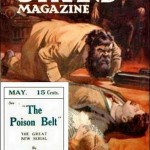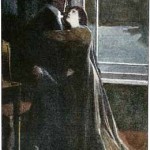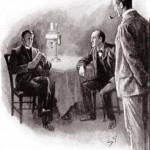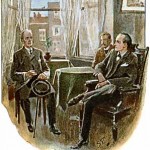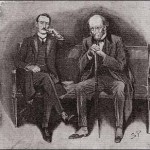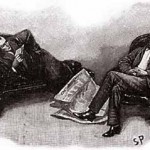“How is Mr. Holmes, sir?” he asked.
It was an old acquaintance, Inspector Morton, of Scotland Yard, dressed in unofficial tweeds.
“He is very ill,” I answered.
He looked at me in a most singular fashion. Had it not been too fiendish, I could have imagined that the gleam of the fanlight showed exultation in his face.
“I heard some rumour of it,” said he.
The cab had driven up, and I left him.
Lower Burke Street proved to be a line of fine houses lying in the vague borderland between Notting Hill and Kensington. The particular one at which my cabman pulled up had an air of smug and demure respectability in its old-fashioned iron railings, its massive folding-door, and its shining brasswork. All was in keeping with a solemn butler who appeared framed in the pink radiance of a tinted electrical light behind him.
“Yes, Mr. Culverton Smith is in. Dr. Watson! Very good, sir, I will take up your card.”
My humble name and title did not appear to impress Mr. Culverton Smith. Through the half-open door I heard a high, petulant, penetrating voice.
“Who is this person? What does he want? Dear me, Staples, how often have I said that I am not to be disturbed in my hours of study?”
There came a gentle flow of soothing explanation from the butler.
“Well, I won’t see him, Staples. I can’t have my work interrupted like this. I am not at home. Say so. Tell him to come in the morning if he really must see me.”
Again the gentle murmur.
“Well, well, give him that message. He can come in the morning, or he can stay away. My work must not be hindered.”
I thought of Holmes tossing upon his bed of sickness and counting the minutes, perhaps, until I could bring help to him. It was not a time to stand upon ceremony. His life depended upon my promptness. Before the apologetic butler had delivered his message I had pushed past him and was in the room.
With a shrill cry of anger a man rose from a reclining chair beside the fire. I saw a great yellow face, coarse-grained and greasy, with heavy, double-chin, and two sullen, menacing gray eyes which glared at me from under tufted and sandy brows. A high bald head had a small velvet smoking-cap poised coquettishly upon one side of its pink curve. The skull was of enormous capacity, and yet as I looked down I saw to my amazement that the figure of the man was small and frail, twisted in the shoulders and back like one who has suffered from rickets in his childhood.
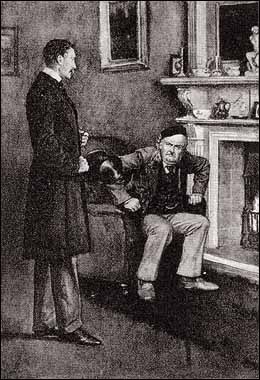
“What’s this?” he cried in a high, screaming voice. “What is the meaning of this intrusion? Didn’t I send you word that I would see you to-morrow morning?”
“I am sorry,” said I, “but the matter cannot be delayed. Mr. Sherlock Holmes–”
The mention of my friend’s name had an extraordinary effect upon the little man. The look of anger passed in an instant from his face. His features became tense and alert.
“Have you come from Holmes?” he asked.
“I have just left him.”
“What about Holmes? How is he?”
“He is desperately ill. That is why I have come.”
The man motioned me to a chair, and turned to resume his own. As he did so I caught a glimpse of his face in the mirror over the mantelpiece. I could have sworn that it was set in a malicious and abominable smile. Yet I persuaded myself that it must have been some nervous contraction which I had surprised, for he turned to me an instant later with genuine concern upon his features.
“I am sorry to hear this,” said he. “I only know Mr. Holmes through some business dealings which we have had, but I have every respect for his talents and his character. He is an amateur of crime, as I am of disease. For him the villain, for me the microbe. There are my prisons,” he continued, pointing to a row of bottles and jars which stood upon a side table. “Among those gelatine cultivations some of the very worst offenders in the world are now doing time.”
“It was on account of your special knowledge that Mr. Holmes desired to see you. He has a high opinion of you and thought that you were the one man in London who could help him.”
The little man started, and the jaunty smoking-cap slid to the floor.
“Why?” he asked. “Why should Mr. Homes think that I could help him in his trouble?”
“Because of your knowledge of Eastern diseases.”

